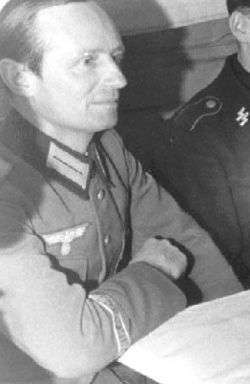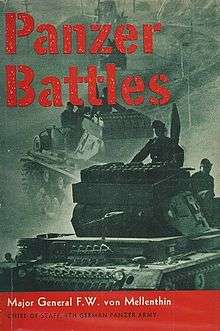Friedrich von Mellenthin
| Friedrich Wilhelm von Mellenthin | |
|---|---|
 | |
| Born |
August 30, 1904 Breslau, Silesia, German Empire |
| Died |
June 28, 1997 (aged 92) Johannesburg, South Africa |
| Allegiance |
|
| Service/branch |
Reichswehr Heer |
| Years of service | 1924–45 |
| Rank | Generalmajor |
| Unit |
III Army Corps Second Army Afrika Korps XLVIII Panzer Corps Army Group G 5th Panzer Army |
| Commands held | 9th Panzer Division |
| Battles/wars | World War II |
| Other work | Author of Panzer Battles |
Friedrich Wilhelm von Mellenthin (30 August 1904 – 28 June 1997) was a Generalmajor in the German Army during the Second World War. A participant in most of the major campaigns of the war, he became known afterwards for his apologetic memoirs Panzer Battles, first published in 1956 and reprinted several times since then.
Mellenthin's works were part of the exculpatory memoirs genre that fed the post-war revisionist narrative, put forth by former Wehrmacht generals. Panzer Battles was instrumental in forming the misconceptions that influenced the U.S. view of Eastern Front military operations up to 1995, when Soviet archival sources became available to Western and Russian historians.
Career
Mellenthin was born in Breslau; his brother Horst von Mellenthin was also a World War II general. In 1924, Friedrich von Mellenthin enlisted in the Reichswehr; in 1932 he married Ingeborg von Aulock. He was assigned to the Prussian Military Academy in 1935. Between 1937 and June 1941, Mellenthin held several general staff positions in the Wehrmacht, during the Invasion of Poland, the Battle of France and the Balkans Campaign. In June 1941, Mellenthin was posted to North Africa, where he served as a staff officer in the Afrika Corps until September 1942.
Till May 1944, Mellenthin served as chief of staff of the XXXXVIII Panzer Corps in the Soviet Union, under General Hermann Balck, including the Battle of Kursk, the Battle of Kiev, and the spring 1944 retreat through the western Ukraine. In September 1944, Mellenthin followed Balck to the 4th Panzer Army and then to Army Group G in eastern France. On December 28, Mellenthin was given command of 9th Panzer Division, which was then engaged in the Battle of the Bulge. From March to May 1945 he was chief of staff of the 5th Panzer Army.
Mellenthin was captured by the British Army on May 3, 1945 and spent two and a half years in a POW camp. He professed ignorance of Nazi activities, writing in his memoirs: "not until we were behind barbed wire did we learn of the misdeeds of the Supreme Authority, deeds which shook us to the core and made our cheeks burn with shame". After his release, Mellenthin emigrated to South Africa. He died in Johannesburg in 1997.
Authorship and reception

Mellenthin's book Panzerschlachten, translated into English as Panzer Battles, documents Wehrmacht's campaigns that he participated in. The book was reprinted six times in the U.S. between 1956 and 1976 and continues to be popular among readers who romanticize the German war effort.[1] The veracity of Mellenthin's Panzer Battles and other works has been called into question over the years. The historian Wolfram Wette lists Mellenthin in the group of German generals who authored apologetic, uncritical studies on World War II, alongside Ferdinand Heim, Kurt von Tippelskirch, Waldemar Erfurth and others.[2]
Critics point out that Mellenthin tends to downplay Wehrmacht's failures while extolling the fighting qualities of the German soldier. The historians Ronald Smelser and Edward J. Davies have characterized Mellenthin's works as part of the "exculpatory memoirs" genre that fed the post-war revisionist narrative, alongside books by Erich von Manstein, Heinz Guderian, Hans Rudel and Hans von Luck.[3] Mellenthin blames Wehrmacht's defeat solely on the Soviet advantages in men and materiel, describing the Red Army as a "ruthless enemy, possessed of immense and seemingly inexhaustible resources". As the result, according to Mellenthin, the "endless waves of men and tanks" eventually "submerged" the supposedly superior Wehrmacht.[1]
Several works by historians highlight the consistent depictions of "Russian" opponents in racial terms, as "primitive" "Asiatics".[1][4] Panzer Battles devotes a section to the "Psychology of the Russian Soldier":[4]
No one belonging to the cultural circles of the West is ever likely to fathom the character and soul of these Asiatics, born and bred on the other side of the European frontiers... The Russian is quite unpredictable. Perhaps the key to this attitude lies in the fact the Russian is not a conscious soldier, thinking on independent lines, but is a victim of moods which a Westerner cannot analyze.
Wehrmacht's adversaries on the Eastern Front are depicted in derogatory terms:[1]
Russian soldiers' mental sluggishness makes them quite insensible to losses. The Russian soldier values his own life no more than that of his comrades... Life is not precious to him. He is immune to the most incredible hardships. The Russian soldier is essentially a primitive being. [...] He lacks any true religious or moral balance, and his moods alter between bestial cruelty and genuine kindness.
Panzer Battles was instrumental in forming the misconceptions which influenced the U.S. view of Eastern Front military operations up to 1995, when Soviet archival sources became available to Western and Russian historians. The historian Robert Citino notes the influential nature of Mellenthin's works in shaping the perceptions of the Red Army in the West as "a faceless and mindless horde" whose idea of military art was to "smash everything in its path through numbers, brute force and sheer size". Citino includes Panzer Battles among the German officers' memoirs that are "at best unreliable and at worst deliberately misleading".[5] Citino concludes that, contrary to Mellenthin's archetype of "Ivan the Primitive":[6]
Thanks to modern research, the Red Army now occupies a different position in the history of World War II. Today it is known as a highly skilled and brilliantly led force that absorbed the best Wehrmacht had to offer in 1941, then turned the tables and eventually smashed it. From a primitive horde, it has now become the seedbed of modern military operations.
Works
- Panzer Battles: A Study of the Employment of Armor in the Second World War. First Ballantine Books Edition (1971). New York: Ballantine Books. ISBN 0-345-24440-0
- German Generals of World War II: As I Saw Them (1977). Norman: University of Oklahoma Press.
- NATO Under Attack (1984) (co-authored)
References
Citations
- 1 2 3 4 Smelser & Davies 2008, p. 111.
- ↑ Wette 2006, p. 234.
- ↑ Smelser & Davies 2008, p. 90.
- 1 2 Citino 2012, p. 205.
- ↑ Citino 2012, pp. 204–205, 208.
- ↑ Citino 2012, pp. 204–205.
Bibliography
- Citino, Robert M. (2012). The Wehrmacht Retreats: Fighting a Lost War, 1943. Lawrence, KS: University Press of Kansas. ISBN 978-0-7006-1826-2.
- Smelser, Ronald; Davies, Edward J. (2008). The Myth of the Eastern Front: the Nazi-Soviet war in American popular culture. New York: Cambridge University Press. ISBN 9780521833653.
- Wette, Wolfram (2007). The Wehrmacht: History, Myth, Reality. Cambridge, Mass.: Harvard University Press. ISBN 9780674025776.
External links
- Glantz, David (1987). "American Perspectives on Eastern Front Operations in World War II"., a review of Panzerschlachten by Mellenthin
| Military offices | ||
|---|---|---|
| Preceded by Generalleutnant Harald Freiherr von Elverfeldt |
Commander of 9th Panzer Division 28 December 1944 – February 1945 |
Succeeded by Generalleutnant Harald Freiherr von Elverfeldt |